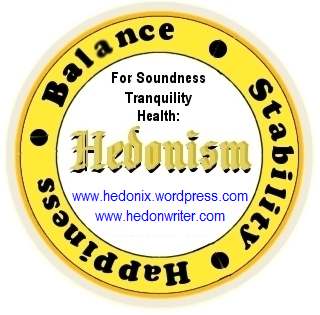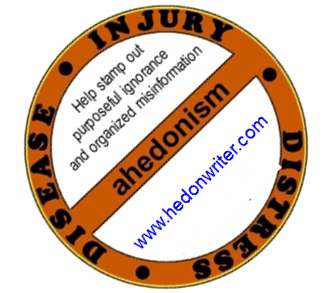Part 1: https://hedonix.wordpress.com/2008/12/08/equivocation/ Part 2: https://hedonix.wordpress.com/2008/12/11/practical-hedonism/ Updated 7/15/2013 
Hedonism promotes healthy living
WHAT IS IMPRACTICAL ABOUT HEDONISM? An ages-old philosophy that competes with religious influences, hedonism has endured more than two millenniums of malignment, misinterpretation and misapplication to the point where most people feel only disgust at any mention of its name. Too often used as an excuse for excess by those who avoid the inconvenient half of its lessons, it has served as a bandwagon crawling with preachers seeking a goat to kill in their sermons.
Modern awareness of medical discoveries, biology and Earth sciences could, if we would pay attention, alert us to defects in Epicurus’ presentation, the missing portions, and imprecise language used to express what he felt according to the standards of his time. Our understanding of hedonism’s correct basic form (that considers actions and choices only in a pleasure/pain scenario) needs to be updated to become meaningful to modern thought.
The Greek philosopher known as the father of ethical hedonism, Epicurus (342-270 B.C.), expressed ethical hedonism as a natural inclination to minimize pain and maximize pleasure in a way that was very advanced thinking for his time. By sticking with his original, outmoded terminology in their own presentations, modern writers discredit much that science has discovered about the biological, emotional and ethical nature of the human being and animated life forms in general.
By limiting hedonism to being only about human beings, such authors discredit its universally natural application as something that has evolved into its current form among us. We apply it without much thought, and condemn it without a full, current conception of everything pertinent to it. Our shared misconceptions are what make it impractical. ‘
PLEASURE’ AND ‘PAIN’ ARE INACCURATE. To begin with, the terms ‘pleasure’ and ‘pain’ have induced too much distractive and counterproductive discussion due to their overly broad, yet self-limiting nature, and to the absence of any real definitions applied to them from the beginning.
Modern language would assert ‘reward’ and ‘aversion’ in their stead, and then apply current knowledge of such subjects as ethology, homeostasis, sociology, ethics and justice. The results can be as well applied to groups as to individuals, to cities, states and countries as easily as to any single entity. Such can be done without twisting rhetorical threads into patterns woven for self-justification without any real-world application or verification, as too often has been the case so far.
AS CURRENTLY UNDERSTOOD AND PRESENTED, HEDONISM SUFFERS CERTAIN WEAKNESSES. A real concern for those vying against hedonic principles is about the abandonment of altruism as a pure and selfless process. If the only reason to reject the philosophy of hedonism is because the current form of this philosophy makes genuinely selfless behavior impossible (as stated in <http://www.ldsphilosopher.com/2008/08/11/the-pleasure-principle/>), that is actually not a valid reason at all. It is simply not a reason, and certainly not a defense that supports altruism as anything real nor makes a case for it as an ideal.
We can understand that the introduction of altruism into topics about hedonism serve only to decoy a reader or listener away from actually assessing either subject on its own merits. As an ethical process, altruism can be redefined according to whatever can eventually be found to be true about it. That can be shown to be a natural part of a hedonic process, once understood in modern terms, as natural to animated sentient beings as to anything else.
Hedonism teaches us to avoid unhealthy living
HEDONISM’S NATURAL OBJECTIVE: As Epicurus seemed incapable express, the objective of hedonic behavior aims to gain and maintain intentional homeostasis or homeorhesis, the physiological balance required for healthy physical and mental existence. Stress results from off-balanced conditions and the internal struggle to maintain them. Stress represents a real problem that has permeated modern living, so that a majority of us suffer from it with little relief, as seen by the high incidence of depression in modern cultures. We do not enjoy a sense of wellbeing in our lives, more because of inhumane systems of irrational belief than for any other reason.
Such beliefs are those which induce behavior that counters our own best interests, and go far beyond the religious persuasions that generally get accused at this point in any discussion. Intentional homeostasis represents an advanced understanding of such ancient terms as ‘ataraxia’ and ‘eudaemonia’, and infers much about such ancient concepts as ‘spirituality’, ‘bliss’, ‘ecstasy’ and ‘joy’, which are but temporary manifestations of it.
WHY ‘PAIN’ IS A WRONG LABEL: To our updated view of hedonism, then, whatever would induce bliss, joy, ecstasy, homeostasis, would be promoted by the sense of good that would become reinforced by them, the modern understanding of pleasure in a philosophical sense. Whatever would negate such a sense, then, would be the aversive reinforcement that Epicurus equated with pain (a word that arises from the same roots as penalty).
Pain, however, can often be shown to contribute not only to homeostasis (as in “a sense of balance in one’s life,” but also to such states as bliss and ecstasy; as, for an example, the orgasm of coitus, a form of pain, but much sought after by any animal capable to experience it; or, the sneeze, also from pain, which restores a semblance of balance to the nostrils by clearing them.
Altruism: The successful achievement of emotional balance opens us up to homeostasis however we go about it. The sense of unbalance drives altruistic impulses as much as it drives any attempts to alleviate stress. Awareness of impoverishment in the midst of affluence will drive any sensitive person to “give back” in ways hoped to counter the imbalance and make it go as much as possible away.
That in no way demarks the altruistic act as self-centered nor other-centered, but does show it to be an entirely natural response to an undesirable condition. Undesirable conditions get seen as penalties that require balancing actions.
The old, and obsolete, way to present both hedonism and altruism required acceptance or denial of selfishness as an end toward which action would be directed. It failed inasmuch as the selfishness of others, set up to benefit from “selfless” acts, never got acknowledged. In our practical view, the role of self becomes simply unimportant. That renders any such acts as automatically ‘selfless.’
IS HEDONISM, THEN, TRULY ‘SELFISHNESS’ AS DESCRIBED? In a different scenario often offered to counter hedonism’s apparent selfish motives, the example of a man who risks his life by jumping into a river to save a child from drowning gets offered as an unquestionably selfless act (sometimes it is a dog that dies trying to save a human). Look at the scene as one in which balance is threatened by the fact of the drowning person’s plight: The river’s forces are far superior to the threatened person’s ability to overcome them. The man (or the dog) does not take time to contemplate his own weaknesses, but takes for granted that he will somehow overcome the odds. The only alternative is an irrational claim that the man (or the dog) purposefully added his own demise to that one already impending, and so selflessly gave up his own life so the other would not die alone.
Balance does not get served in that scenario. So, a modern version of hedonism would not depict a simple, black/white two-dimensional pleasure/pain scenario from which human beings have developed their ethical approaches to socialized existence.
A modern, practical hedonism requires more than that in order to be complete and cogent. Reward, penalty and balance play equal roles on life’s stage, with stability, tranquility and health as rewards, and disease, injury and stress as punishments. That a pleasure/pain schema could be developed from that, and defended accordingly, ought to not surprise us. That the pain half of it should be forgotten for the sake of commerce, politics or religion ought to be even less surprising.
IS THE MOST COMMON CRITICISM JUSTIFIABLE? A criticism could be leveled against our practical picture by stating how it might seem judgmental, that we are claiming those who suffer diseases must somehow deserve them, the same as others somehow deserve their status and wealth. How foolish must we be, that we would expect conditions of heritage, such as existed before a person’s birth, were somehow earned before his or her existence had begun?
No, whatever our circumstances or station, hedonism serves only to acknowledge that, whatever our circumstances, our actions have consequences. Reward and penalty serve as our mentors so that we can learn an ethical process of living, establish a set of values (rewards), and gain a sense of justice by our awareness of how others are affected much the same as ourselves by the same natural rules and their inherent rewards and penalties.
THE MORAL RESULT: Morality begins when humanity learns to turn that sense of justice into an established set of rules according to which we should act as a social animal. Ethics began with humanity seeking to refine its rules into a precise system of formal laws with which to accord in our business relationships, the goals being fairness of trade and a balanced society that serves our needs and rewards our accomplishments while it serves as an umbrella under which we operate the processes of our shared existence.
Morality, then–our sense of good and bad–arrives as a product of nature’s built-in mentoring devices, and not as a result of centralized threat. The result of this philosophy has been presented in a Kindle book at http://www.amazon.com/dp/B00B1U8HL2 Copyright ©2008 by Lloyd H. Whitling.

Fear not, Leave a Reply